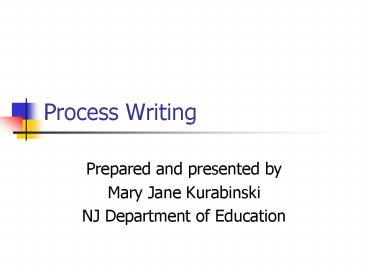Process Writing - PowerPoint PPT Presentation
1 / 17
Title:
Process Writing
Description:
a continual movement among the different steps of the writing model ... Mark Twain. Revising. Focusing on the revisions. Word selection. Sentences ... – PowerPoint PPT presentation
Number of Views:40
Avg rating:3.0/5.0
Title: Process Writing
1
Process Writing
- Prepared and presented by
- Mary Jane Kurabinski
- NJ Department of Education
2
What is Process Writing?
- a continual movement among the different steps of
the writing model - a fluid process created by writers as they write
- a way to become a writer through writing
3
5 Stages of the Model
- Prewriting
- Drafting
- Revising
- Editing
- Publishing
4
Prewriting
- Planning
- Gathering information
- Graphic organizers
- Brainstorming
5
Drafting
- Rough draft/sloppy copy
- Purpose, Audience, Genre
- Composition
6
- Dont write about man,
- write about a man.
- - E. B. White
7
Revising
- Improving the first draft
- Rereading
- Sharing with a partner or small group
- Conferencing with the teacher
8
- Dont say the old lady screamed. Bring her on
and let her scream. - - Mark Twain
9
Revising
- Focusing on the revisions
- Word selection
- Sentences
- Organization of the total piece of writing
10
Editing
- Correcting mechanical errors
- Being accountable against a
- list of unacceptable errors
11
Publishing
- Informal vs. Formal
- Newsletter
- Bulletin Board
- Contests
- Recording of writing
- Illustrating/performing the writing
- Class book/anthology
- Reading to principal
- Literacy/Family night to showcase work
12
Writing Workshop
- Block of time every day for students to write
using the process - Mini-lessons
- Conferencing and individualized instruction based
on students - background
- interests
- perceptions
- ideas, etc.
13
Mini-lessons
- Categories of lessons (Atwell, p. 153)
- Procedural (rules, routines)
- Craft (what authors consider when they write)
- Conventions (what we need to do to be understood)
- Strategies of good writers
14
Mini-lessons
- Figurative language
- Main character development
- Sequels
- Voice/point of view
- Author studies
- Types of writing
- Writers craft
- Mechanics
- Teacher-modeled writing (Be transparent!)
15
Conferencing
- Meet with child regularly
- Discuss
- Selection of topic
- Improvement of work
- Importance of work to the student/task
- Related work
- Value to the childs portfolio
- Next steps
16
What does the classroom look like?
- During the mini-lesson
- During the writing block
- The rest of the day
17
- Questions/Discussion































